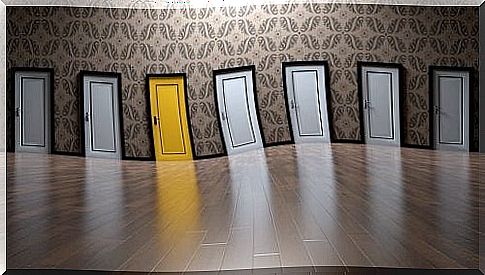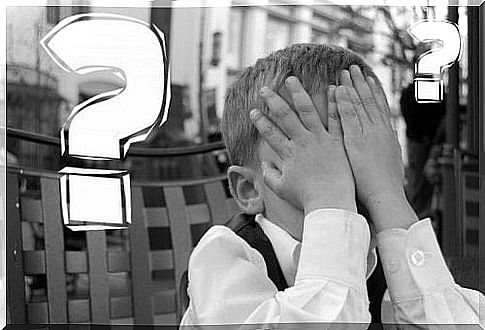How Does Fear Of Choosing Affect Us?

Few fears are as common as having to choose. Making a decision is a task in which, theoretically, we are all experts, because we decide something every day and at all times. However, sometimes we get stuck and don’t know what the best option is.
The inability to make a decision can be experienced by people of different cultures, professions, educational and socioeconomic levels. We live in a society full of information and knowledge, which offers a great variety of options for (almost) everyone.
On the other hand and at first, we might think that relying on different sources of information and options could make it easier for us to choose which decisions to make. However, very often, having so many different options, it becomes difficult to choose and we get stuck.
One of the most frequent causes of this block, not to mention the direct culprit, is an emotion: fear. We may feel blocked, for example, with respect to the doubt of continuing to be with our partner or separating, changing jobs, having children, choosing a specific university career, etc.
Faced with important situations in our life or decisions that do not allow us to go back, the fear of choosing could become very strong. It can lead us to put the decision aside, incubating the malaise that this presupposes. In other words, “if I don’t know what to do or which path to take, I postpone the decision”. We could do this in the hope that new information will come up that makes us feel happier or that spending time itself eliminates some of the options that block us. As you can see, the fear of choice greatly affects our lives.

The fear of making mistakes
We could say that this fear is the most frequent. The more important the decision, the more intense the fear of making a mistake. We are talking about a fear that has a very important adaptive function: to make us act with caution and protect ourselves and others. We feel a great precipice and we have to decide.
The fear of making a mistake is a fear related to the responsibility we have regarding a choice. It makes us think and evaluate the possible options before making a decision. It is a fear that is constantly present in situations that involve a change that is difficult or impossible to reverse and the consequences of which will be important.
Furthermore, some people may also feel a strong fear of having to decide in reversible situations and of little or medium importance, also presenting high levels of anxiety. Usually they are very rational people and who follow their instincts only in very limited cases.
The consequences of the fear of making mistakes
Being afraid of not choosing the correct path can invalidate us. It can lead us to a state of considerable indecision, prolonged reaction times and an exhaustive search for external information regarding the best decision to make.
One of the main causes of the fear of making mistakes is the search for definitive information or conclusions. That is to say, we have the false belief that, by thinking and rethinking, we will come to a sure and definitive conclusion, which will prevent us from doing nonsense.
An intense fear of making mistakes can cause what is known in psychology as “pathological doubt”. Pathological doubt is characterized by an obsessive search for an absolute truth, which is strengthened by a mental compulsion that is expressed through the constant questioning of doubts.

The fear of not being up to par
In this case, we refer to situations in which the person is clear about the decision to make, but doubts about his ability to manage the effects or the consequences of that decision. For example, a person who has to decide whether or not to give a presentation during a congress, could end up refusing the invitation precisely because of this fear, that of not being up to others, to the expectations of others and their own.
Fear of falling short can lead us to avoid positions of responsibility, focus on making minor decisions, and delegate the most important decisions to others. The problems generated by this fear are often related to a feeling of lack of personal courage or low self-esteem.
The fear of not being up to it can also lead us to miss out on precious opportunities because we think we are not sufficiently prepared to face the needs of a given situation. An effective way to overcome the fear of falling short is to work to improve your self-esteem.
The fear of not exercising control or losing it
This fear occurs in people who have a high need for control. If such a person perceives that not everything that implies the decision is under his control, the process of choice paralyzes him. For example, many people turn down a job that involves group projects for this reason.
Managing the need to control everything or dealing with a control fanatic can be a very stressful challenge, as it is a powerful necessity. In extreme cases, the need for control is observed in people suffering from Obsessive Compulsive Personality Disorder.
How to identify the fear of losing control?
The fear of not exercising control or of losing it can be observed both during the decision-making process and when dealing with the consequences of the same. The effects of this fear during the decision making process are usually:
- The person should review all available information before making a decision.
- An indefinite period of time is required to reflect on the decision.
- The pros and cons of the possible options are analyzed several times.
We can also observe the fear of losing control when the decision involves a change in the person’s ability to control. That is to say, we control decision making, but the option we want to choose involves giving up on our control. Resolving to stop exercising control over the results of certain daily habits can be a good way to let go of this fear.
Fear of social rejection
Feeling loved, respected and accepted is one of the basic needs of the human being. Fear of social rejection is very common in situations where we have to make a decision and all possible options are, in a certain way, risky.
We refer to those situations in which making a decision inevitably involves neglecting part of one’s own needs or those of others. For example, when we have to “arbitrate” a situation in which we have to take a stand for or against one of the parties involved.

Problems caused by the fear of social rejection
Fear of social rejection causes various problems, such as making decisions based on the approval of others and not on one’s personal needs. Instead of choosing what would make us happier or what would make us feel better, when we are afraid of social rejection, we choose what others like best or what gives a better image of ourselves.
To work on the fear of social rejection, we can use techniques such as Third Generation Therapy, such as Acceptance and Commitment Therapy. These techniques guide the person to accept different aspects of his life and thoughts that he cannot change and help him make decisions according to his own values and personal needs.
Remember that deciding is a task that we cannot give up and that we cannot delegate to others. Choices are your rudder and will affect your future, so you are responsible. In the event that any of the fears described paralyze you, consult a specialist.








